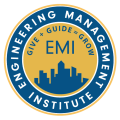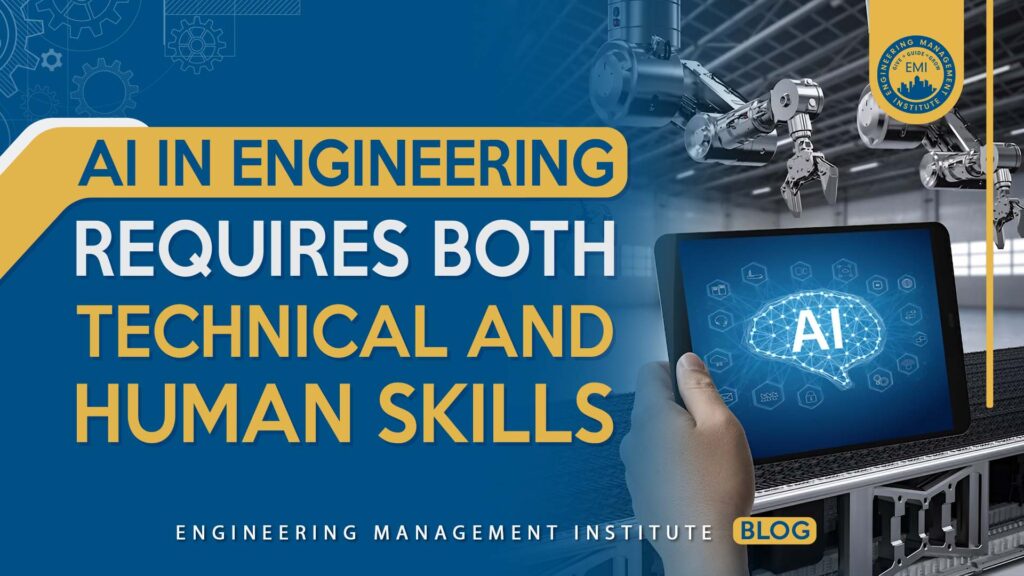“Technology is best when it brings people together.” – Matt Mullenweg
Artificial intelligence (AI) is rapidly transforming industries across the globe, and AI in engineering is no exception.
With AI tools becoming more advanced and accessible, engineers face both unprecedented opportunities and daunting challenges. The question remains: Will AI replace human workers or create new opportunities for growth?
Probably…both.
While the future may be uncertain, one thing is clear—to thrive in this evolving landscape, engineers must embrace AI in engineering while strengthening their uniquely human skills.
Embracing AI in Engineering for Increased Efficiency
AI in engineering offers countless opportunities to improve efficiency and optimize workflow. From automating repetitive tasks to providing instant feedback on designs, AI tools can significantly enhance productivity. These technologies are extremely helpful in a variety of ways, from idea collaboration to writing and content development.
However, engineers don’t need to master every AI tool available. Instead, they should focus on identifying and adopting the ones that best fit their specific needs. By learning how to effectively integrate AI in engineering processes, professionals can stay competitive and avoid falling behind in a rapidly evolving job market.
AI as a Problem Creator, Not Just a Problem Solver
While AI in engineering is celebrated for its problem-solving capabilities, it also introduces new challenges. One significant issue is the increased demand for energy to support AI processing capacities. As AI technologies become more integrated into engineering and other industries, professionals must address the energy and environmental implications of this growth.
The need for sustainable solutions presents an opportunity for engineers to innovate and lead the way in developing energy-efficient technologies. By approaching these challenges proactively, engineers can contribute to creating a more sustainable and technologically advanced future shaped by AI in engineering.
The Rise of Soft Skills in the Era of AI
As AI in engineering takes over routine tasks, the value of human-centric skills becomes more apparent. Machines may be able to analyze data and perform complex calculations, but they cannot replicate qualities like empathy, creativity, and emotional intelligence. These soft skills are essential for effective communication, collaboration, and leadership.
AI will never be able to replicate the things that are human-dependent, such as great leadership and authentic connection with others. Engineers who invest time and effort in developing these skills will set themselves apart in a tech-driven job market increasingly influenced by AI in engineering.
Let me share with you some key soft skills for engineers in this era of AI:
- Emotional Intelligence: understanding and managing one’s emotions while empathizing with others.
- Collaboration: working effectively with diverse teams to achieve common goals.
- Negotiation: finding win-win solutions in complex situations.
- Strategic Thinking: evaluating challenges and opportunities to make informed decisions.
By strengthening these human-centric skills, engineers can enhance their ability to lead and innovate in a world increasingly dominated by AI in engineering.
Flexibility and Adaptability as Key Success Factors in AI in Engineering
The rapid pace of technological change, especially with the rise of AI in engineering, demands that engineers remain adaptable and open to new ways of working. Flexibility is no longer just an advantage—it’s a necessity for long-term success. Engineers who view change as an opportunity rather than a threat are better positioned to thrive in this evolving job landscape.
Building both technical and interpersonal skills increases resilience and adaptability. By embracing AI tools and continuously developing soft skills, engineers can navigate change with confidence and poise—two critical traits in the future of AI in engineering.
Conclusion: Leading the Future with AI in Engineering
The emergence and growth of AI in engineering present both challenges and opportunities for professionals in the field. To thrive in this new landscape, engineers must adopt a dual approach: embracing AI tools to optimize their work and strengthening human-centric skills to set themselves apart. While technology may change rapidly, the value of human connection, creativity, and leadership will always remain essential.
By proactively investing in both technical and interpersonal growth, engineers can future-proof their careers and lead with confidence in the age of AI.
About Jeff Perry, MBA
Jeff Perry is a leadership and career expert known for helping individuals, teams, and organizations unlock their potential in all facets of life. Given his background in engineering, business, and leadership, he specializes in working with engineering and technical professionals, but the principles he shares are universal.
He is the author of the bestselling book, “The Intentional Engineer: A Guide to a Purpose-Driven Life and Career for Engineers and Technical Professionals.”
Jeff received a Bachelor of Science in Mechanical Engineering from Brigham Young University, and a Master of Business Administration from the University of Washington.
A sought-after teacher and speaker, Jeff is happily married to Robin. Together they have four children, and live in beautiful Pullman, Washington.
You can reach Jeff on LinkedIn at https://www.linkedin.com/in/jeffcperry or learn more at jeff-perry.com.
Please leave your comments, feedback or questions in the section below.










